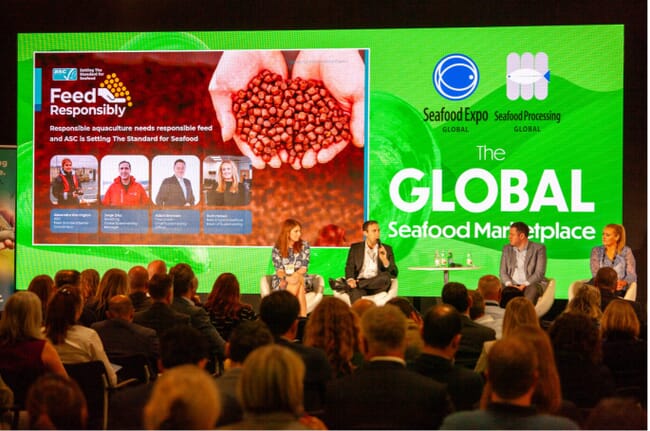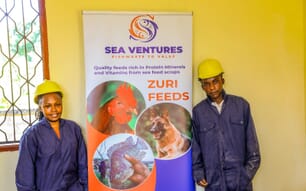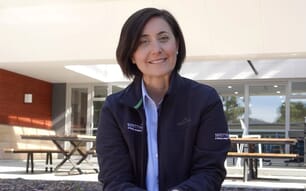
An expert panel hosted by the ASC explored the importance and impacts of responsibly produced aquafeeds © ASC
Hosted in Barcelona, Catalonia, this year’s Seafood Expo Global event proved a resounding success for the Aquaculture Stewardship Council (ASC). Hundreds of seafood lovers, experts, retailers, buyers, processors, and other enthusiasts were welcomed to the distinctive branded booth during the three-day event, which brought together more than 35,000 seafood professionals.
In addition to ASC's presence at their booth, the certification organisation hosted an expert panel session focussing on the importance of responsibly produced aquafeed, which drew a crowd of over 100 eager participants.
With the theme “Feed Responsibly: Why Responsible Aquaculture Needs Responsible Feed,” key industry players shared how they are adopting the ASC Feed Standard to drive transparency, social and environmental improvements in feed supply chains.
“We are overwhelmed by the support and positive feedback of the industry towards responsible feed. Responsible aquaculture requires responsible feed, and we need all players across the supply chain to do their part in achieving more environmentally and socially responsible practices,” said ASC Feed Standard senior coordinator Alexandra Warrington, in a press release from the organisation.
The expert panel included Skretting’s global sustainability manager, Jorge Diaz, Thai Union’s chief sustainability officer, Adam Brennan and New England Seafood’s head of sustainability, Ruth Hoban. Attendees heard their thoughts on the Feed Standard and their experience of the process.
“Since undergoing the certification process, we now have better traceability, a better understanding of what is in feed and the risks associated with these ingredients. The journey doesn’t end once feed mills are certified - the movement to more responsible feed needs to be driven by the market and it must be a value chain approach,” commented Jorge Diaz.
“The ASC Feed Standard helps us de-risk our supply chains, aids answering questions from retailers, mitigates our impacts and provides commercial opportunities. We chose ASC because it is the only standard that tackles deforestation and land conversion of all crops in feed, not just soy and palm oil,” added Brennan.
With more feed companies currently undergoing the certification audit process, the spread of more environmentally and socially responsible feed production continues to grow globally.
Aiming to support this transition, ASC certified farms have until October 2025 to switch to sourcing compliant feed produced under the ASC Feed Standard. Additionally, feed mills that get certified in 2024 will not have to pay licence fees on the volume of compliant feed they produce this calendar year.





